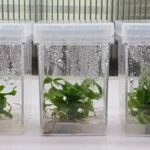Indian Scientists Identify a Special Gene That Strengthens Immune Response
New Delhi : Pineapple is one of those fruits that makes your mouth water just at the sight of it. However, the biggest challenge with this fruit is a specific kind of fungus that causes it to rot—but not anymore. Indian researchers have identified a gene in pineapple that can protect the fruit from destructive fungal attacks.
One of the major threats to pineapple cultivation is a disease called Fusariosis, caused by the aggressive fungus Fusarium moniliforme. This fungus deforms the plant’s stem, blackens its leaves, and causes the fruit to rot from within, leading to significant losses for farmers.
Scientists from the Bose Institute—an autonomous institute under the Department of Science and Technology—have identified the gene behind Somatic Embryogenesis Receptor Kinase (SERK), which can activate the plant’s collective immune response against diseases. Professor Gaurav Gangopadhyay, along with his PhD student Dr. Soumili Pal, enhanced this gene in pineapple plants. This genetic modification triggered the plant’s natural defense mechanism, making it far more effective at fighting fungal infections compared to conventional varieties.











